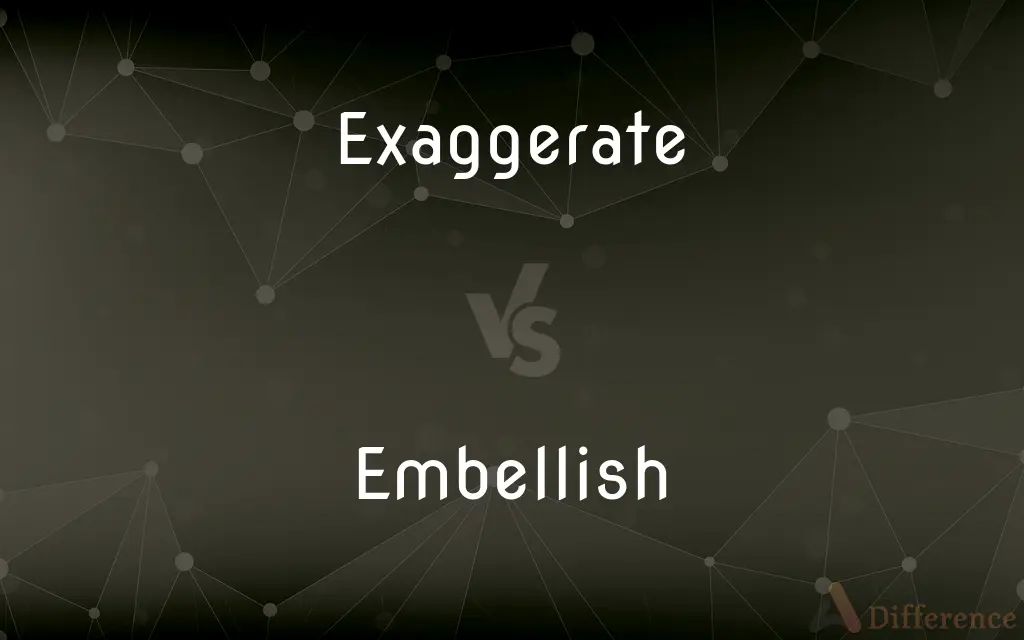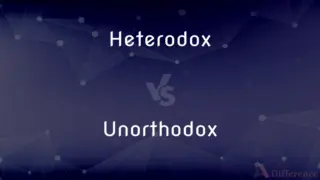Exaggerate vs. Embellish — What's the Difference?
Edited by Tayyaba Rehman — By Urooj Arif — Updated on May 2, 2024
Exaggerate involves overstating or magnifying the truth beyond its actual proportions, to make something appear more dramatic or severe, while embellish involves adding details or features to make a story or object more interesting or attractive.

Difference Between Exaggerate and Embellish
Table of Contents
ADVERTISEMENT
Key Differences
Exaggeration is a rhetorical device used to stretch the truth, making events, actions, or emotions seem more significant or intense than they really are. On the other hand, embellishment can include adding fictitious details or decorative elements, enhancing the original truth to make a story or object more appealing or engaging.
When someone exaggerates, the core focus is often on impact, influencing how others perceive the truth, potentially distorting it significantly. In contrast, to embellish typically means to add tasteful extras that enhance the narrative or object, sometimes improving upon the basic form without necessarily distorting it.
Exaggeration is commonly used in everyday speech to emphasize feelings or experiences, such as saying "I've told you a million times." Embellishment, however, is frequently seen in artistic or literary contexts, such as adding adjectives to make a description more vivid.
The intention behind exaggeration can often be to elicit a stronger reaction or response from the audience, whether it's amusement, sympathy, or shock. Meanwhile, embellishment might aim to create a deeper appreciation or enjoyment, enriching the audience's experience.
While both exaggeration and embellishment alter the basic truth, exaggeration is more likely to lead to misunderstandings or misrepresentations due to its broader stretch of reality, whereas embellishment typically remains closer to the truth, merely beautifying or enhancing it.
ADVERTISEMENT
Comparison Chart
Definition
To make something seem larger or more important than it is.
To add decorative details or features to enhance attractiveness.
Purpose
Often used to emphasize or influence perception dramatically.
Used to add interest or beauty, enhancing the original.
Usage Contexts
Common in everyday language, storytelling, and humor.
Often found in art, literature, and decorative arts.
Impact on Truth
Can distort the truth significantly.
Tends to stay closer to the truth, enhancing rather than distorting.
Example
"He's as strong as an ox!" (whereas he might just be moderately strong)
"The ancient vase was embellished with gold and rubies." (adding decorative details to an object)
Compare with Definitions
Exaggerate
To amplify a statement or detail beyond the truth.
In his story, he exaggerated the danger he was in.
Embellish
To improve or beautify by adding detail or ornamentation.
The illustrator embellished the book with colorful drawings.
Exaggerate
To describe something as greater or more intense than it really is.
She exaggerated her ordeal to gain more sympathy.
Embellish
To enhance a basic item or story with artistic elements.
The chef embellished the dish with edible flowers.
Exaggerate
To increase or enlarge beyond bounds or the truth.
Advertisers often exaggerate the benefits of their products.
Embellish
To decorate or adorn something with ornamental details.
She embellished her dress with lace and pearls.
Exaggerate
To use hyperbole for emphasis or effect.
He exaggerated the size of the fish he caught.
Embellish
To add fictitious details to a story to make it more interesting.
He embellished the tale to captivate his audience.
Exaggerate
To overstate the truth for effect.
He always exaggerates his role in the project.
Embellish
To make more attractive by adding extra, often unnecessary, features.
The narrative was embellished with imaginative descriptions.
Exaggerate
To overstate, to describe more than is fact.
I've told you a billion times not to exaggerate!
He said he’d slept with hundreds of girls, but I know he’s exaggerating. The real number is about ten.
Embellish
To make beautiful, as by ornamentation; decorate.
Exaggerate
To consider, represent, or cause to appear as larger, more important, or more extreme than is actually the case; overstate
Exaggerated his own role in the episode.
Exaggerated the size of the enemy force.
Exaggerated how difficult the project would be.
Embellish
To add ornamental or fictitious details to
A fanciful account that embellishes the true story.
Exaggerate
To make overstatements.
Embellish
To make more beautiful and attractive by adding ornamentation; to decorate.
The old book cover was embellished with golden letters
Exaggerate
Exaggerative; overblown.
Embellish
(by extension) To enhance by adding something not strictly integral or necessary.
Exaggerate
To heap up; to accumulate.
Embellish
To make something sound or look better or more acceptable than it is in reality; to distort, to embroider.
To embellish a story, the truth
Exaggerate
To amplify; to magnify; to enlarge beyond bounds or the truth ; to delineate extravagantly ; to overstate the truth concerning.
A friend exaggerates a man's virtues.
Embellish
To make beautiful or elegant by ornaments; to decorate; to adorn; as, to embellish a book with pictures, a garden with shrubs and flowers, a narrative with striking anecdotes, or style with metaphors.
Exaggerate
To enlarge beyond bounds or the truth;
Tended to romanticize and exaggerate this `gracious Old South' imagery
Embellish
Add details to
Exaggerate
Do something to an excessive degree;
He overdid it last night when he did 100 push-ups
Embellish
Be beautiful to look at;
Flowers adorned the tables everywhere
Embellish
Make more attractive by adding ornament, colour, etc.;
Decorate the room for the party
Beautify yourself for the special day
Embellish
Make more beautiful
Common Curiosities
Why do people exaggerate?
People might exaggerate to make a story more dramatic, to evoke a stronger reaction, or to emphasize their point.
Is embellishing a story always considered lying?
Not necessarily; embellishing can be part of creative storytelling, aiming to entertain rather than deceive.
What is the main difference between exaggerate and embellish?
Exaggerate focuses on overstating elements to make them seem more significant, while embellish involves adding details to enhance or beautify.
What skills are involved in effective embellishment?
Effective embellishment requires a good sense of aesthetics, creativity, and discretion to enhance without overwhelming the original.
Are there cultural contexts where exaggeration or embellishment are particularly prevalent?
Yes, some cultures appreciate and expect a certain level of embellishment in storytelling or art, while others might value straightforwardness and see exaggeration as less desirable.
Can both exaggeration and embellishment be found in advertising?
Yes, both techniques are used in advertising to capture attention and enhance appeal, though exaggeration needs careful handling to avoid misleading consumers.
Can exaggeration change the perception of truth?
Yes, exaggeration can significantly alter how the truth is perceived, potentially leading to misconceptions.
How do exaggeration and embellishment affect communication?
They can make communication more engaging or persuasive, but when overused, they might lead to credibility issues or misunderstandings.
Does exaggeration have a negative connotation?
It can have a negative connotation if it leads to misunderstanding or deception, though it's often used humorously or benignly.
How can embellishment be beneficial in art?
In art, embellishment can add depth, interest, and emotional impact, enriching the viewer's experience.
Share Your Discovery

Previous Comparison
Hub vs. Server
Next Comparison
Heterodox vs. UnorthodoxAuthor Spotlight
Written by
Urooj ArifUrooj is a skilled content writer at Ask Difference, known for her exceptional ability to simplify complex topics into engaging and informative content. With a passion for research and a flair for clear, concise writing, she consistently delivers articles that resonate with our diverse audience.
Edited by
Tayyaba RehmanTayyaba Rehman is a distinguished writer, currently serving as a primary contributor to askdifference.com. As a researcher in semantics and etymology, Tayyaba's passion for the complexity of languages and their distinctions has found a perfect home on the platform. Tayyaba delves into the intricacies of language, distinguishing between commonly confused words and phrases, thereby providing clarity for readers worldwide.
















































